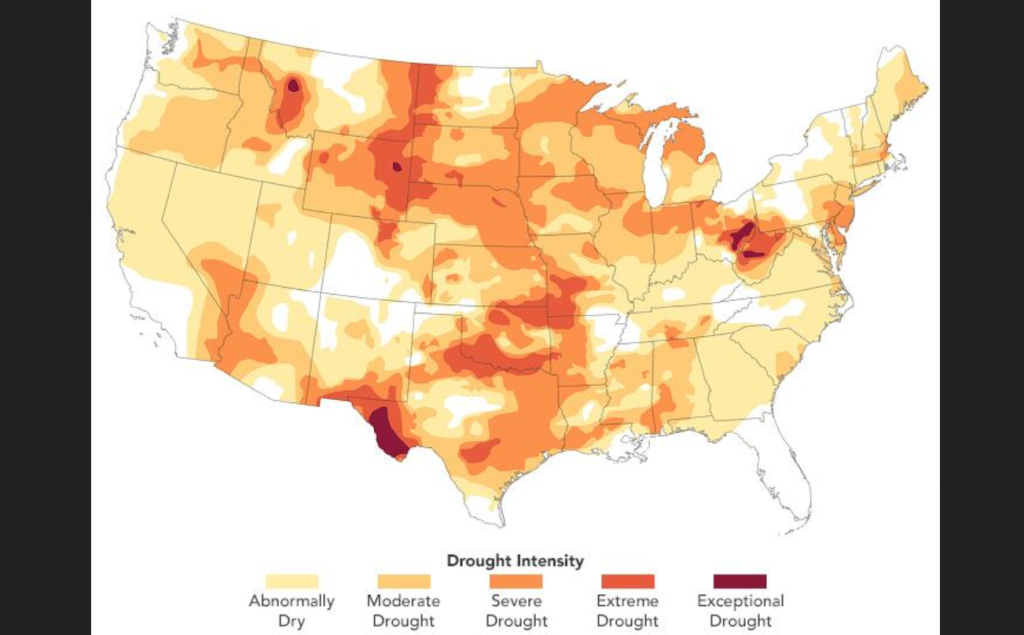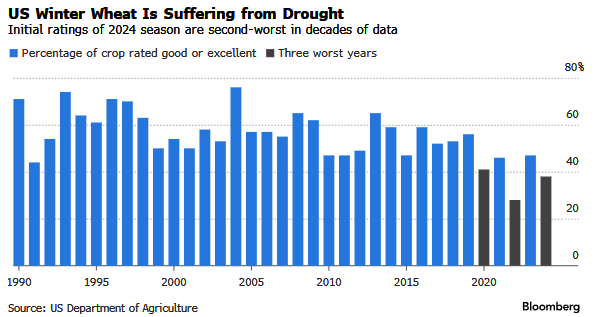By Tyler Durden
A high-pressure system over North America has caused widespread dryness across the Lower 48, pushing a record percentage of the US population into drought conditions, damaging crop harvests and cattle pastures.
The latest data from the US Drought Monitor shows that 78% of the US population resides in areas plagued by “abnormal dryness and drought,” according to NASA Earth Observatory.
Here’s more from the report:
Drier- and warmer-than-normal weather dominated the country during much of October, caused by a strong ridge of high pressure that lingered high in the atmosphere for weeks. According to the Southeast Regional Climate Center, 100 weather stations across the US recorded no rain in October, including the cities of Philadelphia, Atlanta, Birmingham, Dallas, Las Vegas, and Sacramento. Over 70 weather stations recorded the driest October on record.
The map above shows conditions in the contiguous US on October 29, 2024, as reported by the U.S. Drought Monitor, a partnership of the US Department of Agriculture, NOAA, and the University of Nebraska-Lincoln. The map depicts drought intensity in progressive shades of yellow to red. It is based on an analysis of climate, soil, crop, and water condition measurements from more than 350 federal, state, and local observers around the country. NASA contributes several measurements and models that aid the drought monitoring effort.
Drought had expanded from covering just 12 percent of the country in June to 54 percent as of October 29. The rapid development created what NOAA describes as a “flash drought” in many parts of the country. Flash droughts are typically brought on by lower-than-normal rates of precipitation, accompanied by abnormally high temperatures, wind, or radiation.
In terms of agricultural markets, Bloomberg published a new note outlining how droughts in top farming belts in the US could impact winter wheat production…
Wheat will be in the spotlight this week, with two key reports shedding light on the world’s supply of the key cereal crop. The US Department of Agriculture’s Monday crop progress report includes an update on conditions of US wheat, which is off to an historically bad start due to drought. Then on Friday, the agency will estimate global grain supply and demand amid concerns that top exporter Russia will ship less wheat. Wheat futures fell in Chicago on Monday.
While NASA conveniently blames adverse weather conditions on “human-caused climate change,” why has the corporate media remained silent on the impact of the 2022 Hunga Tonga volcanic eruption on disrupting global weather patterns?
Source: ZeroHedge
Become a Patron!
Or support us at SubscribeStar
Donate cryptocurrency HERE
Subscribe to Activist Post for truth, peace, and freedom news. Follow us on Telegram, HIVE, Minds, MeWe, Twitter – X and Gab.
Provide, Protect and Profit from what’s coming! Get a free issue of Counter Markets today.
Read the full article here



